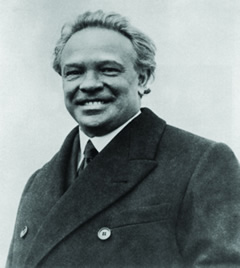OTTORINO
RESPIGHI:
REINVENTING THE OLD FOR A NEW VISION OF THE ART
Son of Bolognese culture, for his eclectic nature,
Respighi tries to waken the Italian musical panorama by proposing the symphonic
and instrumental genre.
Maria Chiara Mazzi
When
we think about Bolognese music, what probably comes to mind first are names of
protagonists of today's light music (Dalla, Morandi, Carboni, etc.). When we
think, on the other hand, about powerful music, the name that comes to mind is
that of Padre Martini, who gave his name to the Conservatory, and then of so
many other distinguished individuals, though not born in Bologna, but who have
influenced the culture of the city (Mozart, Rossini, Wagner). Ottorino Respighi
is not a name that is remembered as well. But, not only is he born in Bologna in
1879, he has also studied and taught at the Liceo Musicale, and was buried in
the Cimitero Monumentale della Certosa. He was born at the end of the street,
later named Largo Respighi, which was to the left of the Teatro Communale. He
received his diploma from the Liceo Musicale where he studied piano, violin and
composition. An itinerary seemingly common to many students. But, Ottorino
studies with Martucci and Torchi, those who, in Italy, have tried to waken the
musical panorama by introducing, other than the omnipresent melodrama, Austrian
and German instrumental music.
Son of Bolognese culture for his eclectic
nature, Respighi needs more challenge and leaves for Russia, where he will play
violin at the Imperial Theatre in St. Petersburgh, and study with
Rimskij-Korsakov. After Russia, he will go to Berlin, where he will also play
and take lessons with a renown musician, Max Bruch. Given this experience, his
predilection for the symphonic and instrumental genre seems inevitable (even if
melodrama is to be found in his repertory, particularly at the beginning of his
career, it is later no longer part of it). Who does not remember the Fontane di
Roma, the Pini di Roma and the Feste romane, maybe among the best known Italian
pages for orchestra?
Respighi takes anything that is useful in
European music from the end of the nineteenth century to create an Italian
instrumental genre, the Russian symphonic nature, the Austro-German
constructiveness, the colouristic orchestral ability of the French. With this,
he reinvents the Gregorian and ancient Renaissance music to create a language
that is unusual, new, and fresh, the musical equivalent of the contemporary
architectural and literary mode. Respighi was to be very appreciated by the
Regime because his works was interpreted in terms of nationalism (though it was
not nationalistic), this ended up hurting him later in the judgement of his
music.
In 1936, Respighi died in Rome (where he was
teaching at the Santa Cecilia Academy), and therefore could not demonstrate,
like others, a true stylistic evolution. He remained however linked to Bologna,
where he had begun his career and where he became, as a testimony of his being
Bolognese, honorary associate of the oldest Bolognese society, the Fameja
Bulgneisa. His is buried in Bologna, close to Carducci who, like him, had tried
to reinvent the old in order to build a new vision of the
art.
